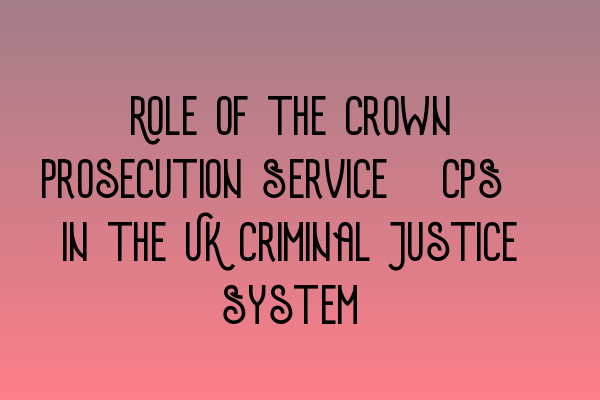Role of the Crown Prosecution Service (CPS) in the UK Criminal Justice System
The Crown Prosecution Service (CPS) plays a crucial role in the UK Criminal Justice System. As the principal prosecuting agency in England and Wales, the CPS is responsible for deciding whether or not to prosecute individuals or organizations for criminal offenses, and for conducting prosecutions on behalf of the Crown.
SQE Exam Prep: Essential Study Materials for Aspiring Solicitors
Key Responsibilities of the Crown Prosecution Service
The CPS has several key responsibilities within the criminal justice system:
- Case Review: The CPS reviews cases referred to them by the police and other law enforcement agencies. They assess the available evidence and determine whether there is enough to provide a realistic prospect of conviction. This helps ensure that only cases with a reasonable chance of success proceed to court.
- Prosecution Guidance: The CPS provides guidance to the police and other investigators on matters relating to prosecutions. They offer advice on complex legal issues, ensuring fairness and consistency in the decision-making process.
- Preparing and Presenting Cases: If a case is deemed suitable for prosecution, the CPS is responsible for preparing and presenting the case in court. This involves instructing barristers or presenting advocates, gathering evidence, drafting legal documents, and representing the Crown’s case.
- Victim Support: The CPS is committed to supporting victims and witnesses throughout the criminal justice process. They provide information, assistance, and support to ensure that victims are able to participate effectively in proceedings and have their voices heard.
- Working with Partners: The CPS collaborates with various partners, including the police, probation services, and other criminal justice agencies, to ensure effective and efficient delivery of justice. This coordination helps to streamline the process and increase overall effectiveness.
Demystifying the Solicitors Qualifying Examination Format
Importance of the Crown Prosecution Service
The CPS plays a vital role in upholding the rule of law and ensuring a fair and effective criminal justice system. Here are some reasons why the CPS is important:
- Public Interest: The CPS makes decisions about prosecution based on the public interest. They consider factors such as the seriousness of the offense, the impact on the victim and the community, and whether there is sufficient evidence to secure a conviction. This ensures that resources are focused on cases that serve the public interest.
- Fairness and Consistency: By providing clear and consistent guidance, the CPS ensures that decisions about prosecutions are fair and consistent across the country. This helps prevent arbitrary or discriminatory actions and promotes the public’s confidence in the criminal justice system.
- Expertise: The CPS is staffed by experienced prosecutors who possess expertise in various areas of law. Their knowledge and skills help ensure that cases are thoroughly and effectively prepared, increasing the chances of successful prosecutions.
- Victim Support: The CPS places great emphasis on providing support to victims and witnesses. By offering information, assistance, and guidance, they help victims navigate the complex legal process and make their voices heard.
- Efficiency: The CPS’s role in coordinating with other criminal justice agencies ensures an efficient and streamlined process. Collaboration and effective communication help prevent delays and ensures that cases proceed smoothly through the court system.
SQE Exam for International Lawyers: Challenges and Success Strategies
Conclusion
The Crown Prosecution Service (CPS) is a key player in the UK Criminal Justice System. With its responsibilities ranging from case review to victim support, the CPS ensures that prosecutions are conducted fairly, efficiently, and in the public interest. By providing guidance, expertise, and coordination, the CPS plays a crucial role in upholding the rule of law and maintaining public trust in the criminal justice system.
For more information on related topics, please check out the following articles:
- LLC Formation Made Simple: Step-by-Step Guide for UK Entrepreneurs
- LLC Formation: A Step-by-Step Guide for UK Entrepreneurs
